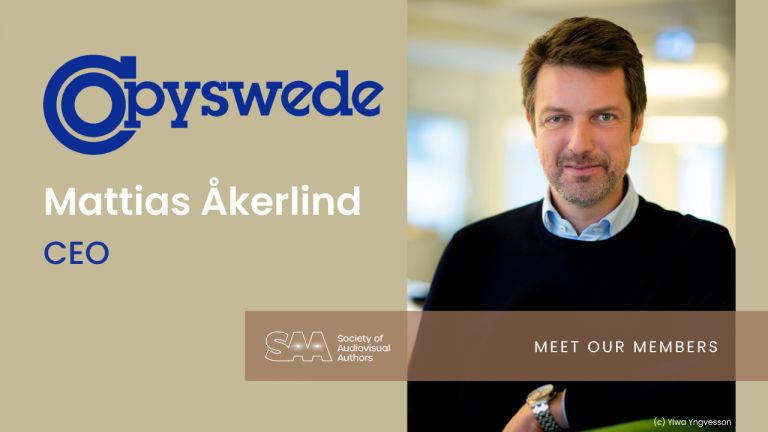Meet our member: Copyswede

On 1 January Sweden took over the Presidency of the Council of the EU. Despite being one of the largest countries with one of the lowest populations per square kilometer in all of Europe, it is the home to Greta Thunberg, Alfred Nobel, Ingmar Bergman, Zlatan Ibrahimovic, ABBA and many more. I talked to Mattias Åkerlind, CEO of Copyswede, from a cold Stockholm.
“I am a lawyer interested in culture and securing fair remuneration for rightholders, this is why I have been with Copyswede for so long. Audiovisual authors need strong organisations such as Copyswede, and the SAA.”
Mattias started at Copyswede almost 25 years ago as a legal advisor. After a couple of years he left, but return later as the Head of Distribution, and for the last 15 years he has been working as the CEO. “I am a lawyer interested in culture and securing fair remuneration for rightholders, this is why I have been with Copyswede for so long. Audiovisual authors need strong organisations such as Copyswede, and the SAA”, said Mattias.
Copyswede was founded in 1982 and turned 40 last year. It is an umbrella organisation just like many of the other Nordic organisations in the audiovisual field. Copyswede have 14 member organisations, all representing authors and performers. Their main contacts are with its member organisations, however, in some fields they offer a service to distribute remuneration to individual authors, among them screenwriters and directors. In total they distribute remuneration annually to more than thousands of rightholders.
Copyswede was established thanks to development of cable networks and a growing interest for TV programmes and channels from neighbouring countries. In the 1980’s they already had Extended Collective Licensing systems that made it possible to license operators and provide remuneration for the rightholders. Since, they expanded to other areas, including private copying.
In 2010, Copyswede became a member of the SAA. The main reason they joined was because of the way European law influenced the national law-making. “It is of great value to be a part of the SAA that brings a strong voice to audiovisual authors and their collective management organisations. SAA has been important for the implementation of SatCab II Directive and now the Copyright directives.”
“It is getting more and more difficult for authors to get royalties.”
After many tough years to get the Copyright legislation through, Sweden is finally implementing the directive from 1 January 2023. A lot of focus has been on the articles concerning Extended Collective Licensing. “We are not really satisfied when it comes to the implementation of Article 18 as we haven’t been able to go all the way”, said Mattias. The way it was implemented leaves Copyswede and its members with a lot of further work to ensure fair remuneration, and they are not sure yet if it will be possible. “It is getting more and more difficult for authors to get royalties”, concluded Mattias.
Right now, Copyswede is working on developing the private copying system and is now in the middle of a process of reviewing and modernising the regulation. The Ministry of Justice presented its public inquiry and Copyswede submitted its position to the public consultation that followed. The main issue with the old system was that it did not specify in the law which products should be included. The industry’s criticism was therefore that it was necessary to take different products to courts, and for the last 8 years the rightsholders won all the court cases. Another concern was that there wasn’t a fixed price per product, instead it was based on storage capacity (gigabyte). “Not in reality, because we negotiated and set fixed prices and tariffs for many years”, explained Mattias. Having a state-financed system is no longer an option. With the new proposal, the tariff will be set by a board every second year. Copyswede will be very active to ensure that the remuneration is maintained at the same level as today. Copyswede entered into agreement with the industry two years ago and last year the remuneration was about 25 million euros to all rightholders (including authors, artists, musicians as well as producers). Unfortunately, the result of the public consultation is expected to be delayed. Mattias remarked that his expectations on the Swedish EU Presidency was low, culture is unfortunately not high on its agenda. He explained that the Presidency is only a part of the reason for the delay with the private copying reform. Another potential challenge is that the Swedish government is initiating a large number of new public inquiries that risk taking up a lot of resources from the Ministry of Justice.
I thanked Mattias for his time, next time we will meet with Copyswede representative will be in a hopefully sunnier Berlin for our SAA board meeting, to which Copyswede was elected last year for the first time.
